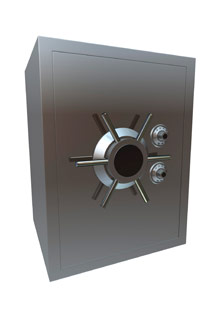Money in the Bank...How Does It Get There?

© 2008 Jupiterimages Corporation
From canceling credit cards slowly to being an aggressive enough investor to avoid a cat food–fueled retirement, Amanda Robb has a wealth of unexpected financial advice.
Financial fitness is a lot like physical fitness: We all know what we should be doing—eliminating credit card debt, saving for emergencies, socking away dizzying amounts in a retirement fund—but finding a plan that works for the average person isn't easy. Even if we buy little notebooks, track every dollar spent and every painful dollar saved, swear off lattes and the stupendous but $28 control-top tights, there's still that small, tinny voice asking, "Are we covered for flooding?"..."Did I pick the right 401(k)?"..."Will I ever be able to pay for my kids' college education?" We realized we needed nothing less than a dream team of experts to go beyond the financial basics, so we enlisted the aid of Eric Tyson (author of Let's Get Real About Money!), Susan Burke (founder of the investment management firm Beechtree Capital), and John Claghorn (senior vice president and wealth management adviser at RBC Dain Rauscher). To answer thorny questions about insurance and home buying, we turned to J. Robert Hunter, director of insurance, and Allen Fishbein, director of housing and credit policy, both at the Consumer Federation of America. And, of course, we grilled O's own Suze Orman for black-belt debt-paying tactics and investment advice. Here, they tackle the bewildering questions and intimidating calculations that stand in the way of real financial serenity.
Tell me something I don't know about paying off credit card debt.
You know that the first thing you have to do is get rid of any debt—and you probably also know to start by tackling the highest-interest credit cards first. But Suze Orman, O columnist and author of Women & Money: Owning the Power to Control Your Destiny, recommends that you don't close the newly paid-off accounts: Keep them open but inactive. "About 30 percent of your credit rating (FICO score) is based on your debt-to-credit ratio," she explains. Closing the accounts will reduce your amount of available credit and hurt your FICO score. When you've cleared all the debts, cancel one card each year, starting with those that have annual fees, then those with the lowest credit limit to highest. (She recommends you keep only two cards.) As you're paying off credit card debt, you might be tempted to transfer balances to a card with an introductory 0 percent interest rate. That's a good idea only when the cost of transferring is less than the interest you would've paid on the old card. Some cards cap the transfer fee at $75; some charge 3 percent of the entire transfer amount. (Bankrate.com has a "real cost of debt" calculator to help you figure this out.)
Do I really have to stash away six months of living expenses?
It depends, says syndicated financial columnist Eric Tyson, who suggests you have enough put away to cover...
- Three months' expenses, if you have family who will loan you money, your employment situation is stable, and you have accounts such as a 401(k) that you can withdraw from—though you might have to pay a 10 percent penalty.
- Six months, if you can't turn to family or friends and your employment situation is wobbly.
- Twelve months, if your income fluctuates wildly or if you are at high risk for job loss.



